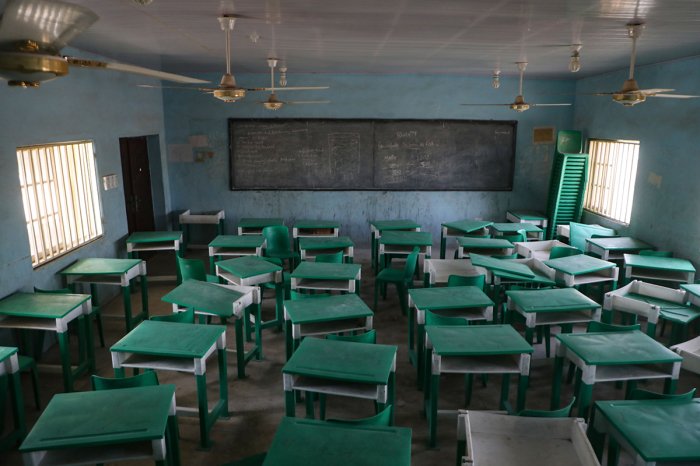About 100 abducted from Nigerian school in broad daylight; 11 rescued, 3 found dead
Cleric warns Nigeria is a 'killing field,' needs 'multi-faceted approach' to fight terrorism

Around 100 students and staff members were abducted from a Nigerian school by armed insurgents on Thursday, and 11 have since been rescued or freed, while three others have been found dead.
Mustapha Yusuf, principal of the federal government college in the remote town of Birnin Yauri, told Reuters that gunmen raided the school in the northwest Kebbi state in broad daylight for a mass abduction of over 94 students (the number is not confirmed) as well as eight staff members.
The armed militants reportedly killed a policeman during the raid.
The army said it rescued three teachers and eight students as of Monday and had killed one of the abductors, Reuters reported.
Two girls and a boy were found dead, two of whom had suffered gunshot wounds in their legs. One is believed to have died of exhaustion, according to Voice of America News.
The kidnappers "have been taking cover under the students," Yusuf was quoted as saying.
"They are in the bush," Yusuf said.
He said the kidnappers had used students’ cell phones to call parents, demanding a ransom worth 60 million nairas (about $146,341).
This kidnapping is part of a trend of mass abductions in northern Nigeria in recent months, including the abduction of nearly 300 schoolgirls in February who were freed days later.
Kidnapping for ransom has become a lucrative industry for criminals and extremist groups in Nigeria.
The government's inaction in holding kidnappers accountable and its willingness to pay ransom to insurgents has led many to believe the government is complicit or complacent toward the attacks and kidnappings.
Solomon Gbetogo Kuponu, an Anglican bishop in Nigeria, warned during a recent session of the church's sixth synod in Ogun state that the government is giving amnesty to terrorists and further fueling insecurity. According to The Daily Trust, Kuponu accused the government of encouraging kidnappers by paying ransoms.
He said the violence and instability have become the worst under President Muhammadu Buhari's administration.
Kuponu said Nigeria has become a "killing field" due to "kidnapping, abduction, banditry, fatal clashes of herdsmen and farmers, ritual killings, political assassination, armed robbery and murder."
"Fighting terrorism needs a multi-faceted approach, to cut off their sources of funding, disrupt their logistics and support networks and decapitate the leadership as the United States' war on terror has proved," Kuponu said.
Northern Nigeria is especially impacted by the surge in mass kidnappings since late 2020, where schools are often the targets.
"The recent abductions we have seen across different states in northern Nigeria tell us that the government is either unwilling or unable to secure schools and protect the right to education," Amnesty International's Seun Bakare said, according to Voice of America News. "Millions of children are now having to pay the price of government's failure to protect citizens from violence."
Hundreds of schools in the north have reportedly shut down in response to the kidnapping surge.
The wave of school kidnappings follows the abduction of 276 Nigerian schoolgirls from a school in Chibok in 2014. The abduction of the Chibok girls gained international attention and inspired the #BringBackOurGirls campaign. Over 112 of the Chibok schoolgirls are still missing.
Maulid Warfa, the United Nations Children’s Fund [UNICEF] field office chief of the Kano state, urged the Nigerian local, state and federal government to ensure the wellbeing of children in schools, according to This Day newspaper.
“Education of our children is fencing very serious challenges, including the mass kidnapping of boys and girls,” Warfa said. “Mass kidnapping of school children is something that is very worrisome to all of us and as UNICEF, we condemned the act.”
“Children are the future of the country, they need their rights to be fulfilled, they need their education to be assured,” he continued.
The Global Terrorism Index ranked Nigeria as the third-most affected country by terrorism in 2020. The index reports that over 22,000 people were killed by acts of terror in Nigeria from 2001 to 2019.
Much of the violent terror is fueled by Islamic extremism and terrorist groups like Boko Haram and radicalized herdsman.
The U.S. Commission on International and Religious Freedom’s 2021 annual report warned Nigeria “will move relentlessly toward a Christian genocide” if action is not taken quickly.
Nigeria was the first democratic nation to be added to the U.S. State Department's list of "countries of particular concern" under the International Religious Freedom Act for engaging in or tolerating “systematic, ongoing and egregious violations of religious freedom.”
Open Door’s World Watch List ranks Nigeria as the ninth-worst country for Christian persecution, stating that Islamic oppression toward believers is rampant and often runs unchecked.
Just under half of the population in Africa’s most populous nation is Christian. Open Doors reports there are over 95 million believers in Nigeria.
Advocates have argued that if the international community does not act, Nigeria could become the next Rwandan genocide if action is not taken quickly.
Emily Wood is a reporter for The Christian Post. She can be reached at: emily.wood@christianpost.com





























